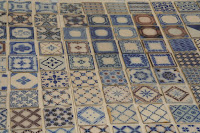Gullible's travels
In my mind, I have a picture of Gulliver tied down with thousands of tiny ropes, especially his hair. This is not the exact image but it was the closest thing I could find. I think of it sometimes when I am lying on the couch. Psychoanalysis is a question of carefully cutting all the little ropes, but the ropes don’t want to be cut, and they automatically grow back, and you have to cut them again and again. In other words, you have to be really serious about being free or the bars of your prison will find you again.
Another similar image is of elephants. The cruellest picture I have of them is the adult females chasing pubescent males out of the group and forcing them to trot off and do their own thing in the jungle. The boys become a nuisance when they reach puberty, so they are excluded. It sometimes takes days to get rid of them. They hang around and cry and try to sneak back into the herd, but the females are relentless in keeping them out. I don’t know exactly how human mothers are supposed to push their male offspring out into the world, but I hope there is a less cruel method.
Here I was thinking of how elephants are trained. One ankle is tied to a post when they are young. They rebel and push and try to free themselves. They find they can’t run away because they don’t have the strength to break the chain or uproot the post. Then they grow up and increase in strength but they have internalised the experience of not being able to run away so they don’t even try anymore. Analysis is a way of identifying the parts of our behaviour that were adopted in childhood circumstances and no longer correspond to our adult setting and means. And ideally adapting the behaviour!
I've just bought a brilliant version of Basin Street Blues by Keith Jarret from I-tunes. I can’t put it on here because it is “protected”. The same goes for The Blower's Daughter I bought specially for my life’s soundtrack. This is frustrating. I’ll have to find a way round it, somehow. Anyway, I was humming the song “Halleluja” the other day and was surprised to learn it was by Leonard Cohen, the man who moved me to take up the guitar to learn to play Suzanne and Bird on a Wire. The best version I found was Alison Crowe, and what do you know, I then found a You Tube tutorial on how to play it! Somebody took the trouble to clearly and slowly explain what to do and how to do it in front of a camera for people like me! That restored my faith in human nature. I never managed to play Danny Boy fluently enough on the piano to be able to sing along with it, so it looks like Leonard could be another first. Watch this space! For the moment, here is Alison Crowe singing Leonard Cohen’s Hallelujah.















